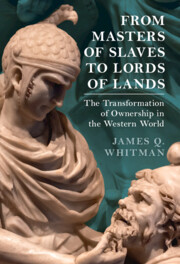Book contents
- From Masters of Slaves to Lords of Lands
- Studies in Legal History
- From Masters of Slaves to Lords of Lands
- Copyright page
- Dedication
- Contents
- Acknowledgments
- Introduction: Owning Humans, Owning Land – Two Primitive Modes of the Property Imagination
- Part I Masters of Men and Beasts
- Part II From Masters to Lords
- 6 Introduction to Part II: From Pierson v. Post to Johnson v. M’Intosh
- 7 From Slavery to Feudalism: The Great Hypothesis
- 8 From Masters to Lords in Late Antiquity
- 9 From the Law of Owning Humans to the Law of Owning Land: The Early Modern Culmination
- Conclusion: From Man the Killer to Man the Tiller
- Bibliography
- Index
- Studies in Legal History
6 - Introduction to Part II: From Pierson v. Post to Johnson v. M’Intosh
from Part II - From Masters to Lords
Published online by Cambridge University Press: 28 November 2024
- From Masters of Slaves to Lords of Lands
- Studies in Legal History
- From Masters of Slaves to Lords of Lands
- Copyright page
- Dedication
- Contents
- Acknowledgments
- Introduction: Owning Humans, Owning Land – Two Primitive Modes of the Property Imagination
- Part I Masters of Men and Beasts
- Part II From Masters to Lords
- 6 Introduction to Part II: From Pierson v. Post to Johnson v. M’Intosh
- 7 From Slavery to Feudalism: The Great Hypothesis
- 8 From Masters to Lords in Late Antiquity
- 9 From the Law of Owning Humans to the Law of Owning Land: The Early Modern Culmination
- Conclusion: From Man the Killer to Man the Tiller
- Bibliography
- Index
- Studies in Legal History
Summary
This chapter discusses the most famous hypothesis about the development of property law: that Western social evolution was determined by a passage “from slavery to feudalism,” from the ownership of humans in the slave economies of Antiquity to the ownership of land in the feudal economies of the Middle Ages. That hypothesis was embraced by Marx, Weber, Bloch, and many others, but has been rejected today, because it rested on claims about economic history that have been proven dubious. The chapter argues that there was truth in the classical hypothesis, but that it should be reinterpreted as an account of transformation in the legal imagination. The chapter investigates the origins of the classic theories, and makes the case that the classic thinkers erred by mistaking the imaginative orientations in the legal sources for the economic realities.
Information
- Type
- Chapter
- Information
- From Masters of Slaves to Lords of LandsThe Transformation of Ownership in the Western World, pp. 231 - 235Publisher: Cambridge University PressPrint publication year: 2025
